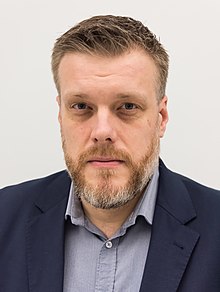|
Adrian Zandberg
Adrian Tadeusz Zandberg [ˈadrian ˈzandbɛrk] ⓘ (born 4 December 1979)[2] is a Polish historian, computer programmer, doctor of humanities, and left-wing politician serving as a member of the Sejm for Warsaw I. He is one of the co-leaders of Partia Razem.[1][3] LifeHis parents moved in 1967 from Poland to Denmark, where Zandberg was born in 1979. In 1985 his family moved back to Poland. After studying history at Warsaw University with Anna Żarnowska, he received his doctorate for his dissertation about British and German left-wing social democratic movements. He also studied computer science at the Polish–Japanese Academy of Information Technology. Political careerAs a student he devoted himself to politics. On 14 November 2001, he published an article in the "Gazeta Wyborcza" daily newspaper written together with civil rights activist Jacek Kuroń on the topic of social justice in Poland.[4] He was elected chairman of the youth wing (Forum Młodych) of the Labour United party (Unia Pracy), was a member of the executive of this party and founded the Federation of Young Socialists (Młodzi Socjaliści).[1] Zandberg describes himself as a socialist and democratic socialist.[5] Partia RazemIn May 2015, he became one of the founders of a political party Partia Razem, and was elected to the nine-member Board, together with Jakub Baran, Aleksandra Cacha, Alicja Czubek, Maciej Konieczny, Magdalena Malińska, Mateusz Mirys, Katarzyna Paprota, and Marcelina Zawisza.[6] Zandberg was placed on the first place on Razem's Warsaw candidate list of the Sejm elections in October 2015. As a Razem's representative during a television debate before the 2015 parliamentary elections, held in Poland on 25 October he represented the smallest of the eight parties. Among other positions, he was the only one of the eight panelists who pleaded for an unconditional acceptance of Syrian war refugees in Poland. Following the debate, some of the media declared him the winner of this discussion, and his appearance at the debate generated more media interest in him and his party in the following days.[7] Zandberg received personally 49,711 votes, but his party won only 3.62 percent of votes, so did not gain any seats in the Sejm.[8] While some commentators claimed that the increase in popularity of Razem was at the expense of the United Left coalition (among others consisting of the Democratic Left Alliance, Your Movement, Polish Socialist Party and The Greens), which also did not win any seats, resulting in neither left-wing party being represented in the new parliament,[9] others, including United Left leader Barbara Nowacka,[10] disagreed with that assessment, pointing out that Razem attracted mostly new voters, and few of its supporters had voted for the SLD or Your Movement in previous elections[11] and that the decrease in popularity of United Left's member parties had been a steady process over the years,[12] due to past errors.[13] Zandberg was subsequently elected a member of the Sejm at the 2019 parliamentary election.[2] In the election, Razem joined with the Democratic Left Alliance and Spring to form a broad progressive alliance known as The Left, as part of which Zandberg was one of 49 members elected.[14] In 2022, he became one of the co-leaders of Razem.[3] In 2024, he was elected as co-leader again.[15] On 11 January 2025 Zandberg was announced as Razem's candidate in the upcoming 2025 presidential election.[16] Personal lifeIn late 1990s Zandberg dated Barbara Nowacka for three years, when they were both members of the Youth Federation of Labour Union.[17][18] Zandberg is married to Barbara Audycka-Zandberg and they have two children.[18] Audycka-Zandberg holds a doctorate in social sciences specialising in housing issues and works as an adjunct professor at the Institute of Applied Social Sciences of the University of Warsaw.[18][19] She run for the district council of Mokotów in 2018 without success.[20] Electoral history
Explanatory notesExternal links"Interview with Adrian Zandberg (in English)". OpenDemocracy. 10 August 2016. Archived from the original on 18 September 2016. Retrieved 17 August 2016. References
|
||||||||||||||||||||||||||||||||||||||||||||||||||||||||||||||||||||||||||||||||||||||||||||||||||
Portal di Ensiklopedia Dunia
